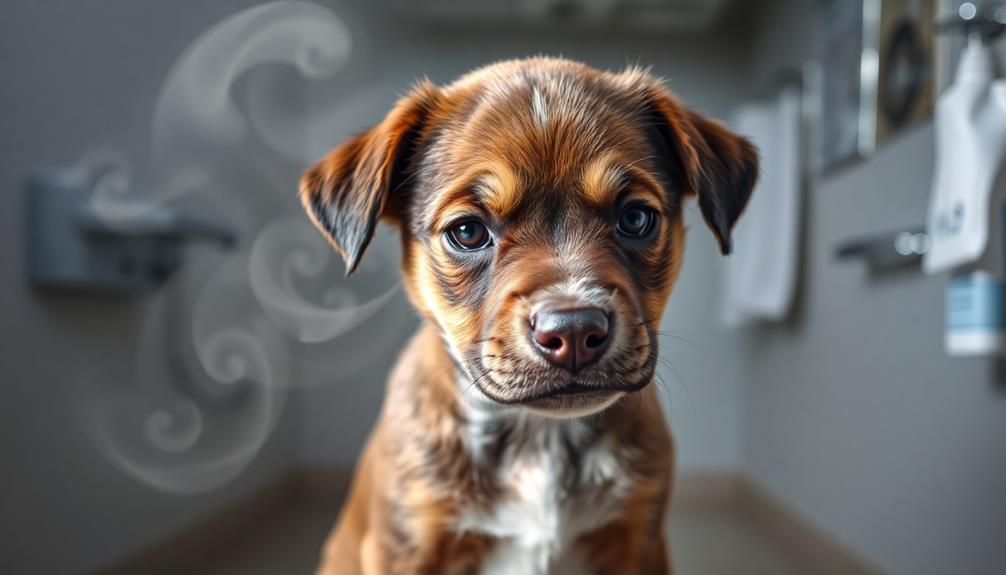If you catch a strong, metallic, and sweet smell coming from your dog's poop, it could be a sign of parvovirus! This unique odor is usually much worse than typical dog feces. It might also smell like something rotting, especially if your dog has diarrhea. Parvo can cause serious tummy troubles, and it's important to act quickly. If you notice this smell, it's best to consult a vet right away. Remember, the sooner you get help, the better! There's so much more to learn about keeping your furry friend healthy, so let's keep exploring!
Key Takeaways
- Feces from dogs infected with parvovirus have a distinct, foul odor often described as metallic and sweet.
- The smell is significantly different from normal dog feces, indicating severe gastrointestinal distress.
- Diarrhea caused by parvovirus results in watery and mushy feces accompanied by a strong rotting smell.
- The odor arises from intestinal damage due to the virus and serves as a warning sign for pet owners.
- Recognition of this unusual smell is crucial for prompt veterinary attention and better treatment outcomes.
Introduction

When you notice an unusual smell coming from your dog's feces, it's crucial to pay attention, as it could be a sign of parvovirus. This virus can be especially dangerous for unvaccinated puppies. The smell of parvo poop is often foul, sometimes even metallic and sweet. If your dog is infected, you might find their diarrhea has a strong rotting odor. This happens because the food in their intestines is breaking down.
Infected dogs may produce stools that are watery or slippery, and you might even see mucus in the feces. Sometimes, the poop can be bloody, showing that your dog is in severe gastrointestinal distress.
It's important to remember that while a bad smell can indicate parvovirus, it doesn't confirm it for sure.
If you notice any of these signs, it's best to visit your veterinarian right away. They can help figure out what's going on and provide the right treatment.
Keeping an eye on your dog's health is essential, and being aware of these smells can help you catch problems early. Your furry friend's well-being depends on it!
Description of the Smell
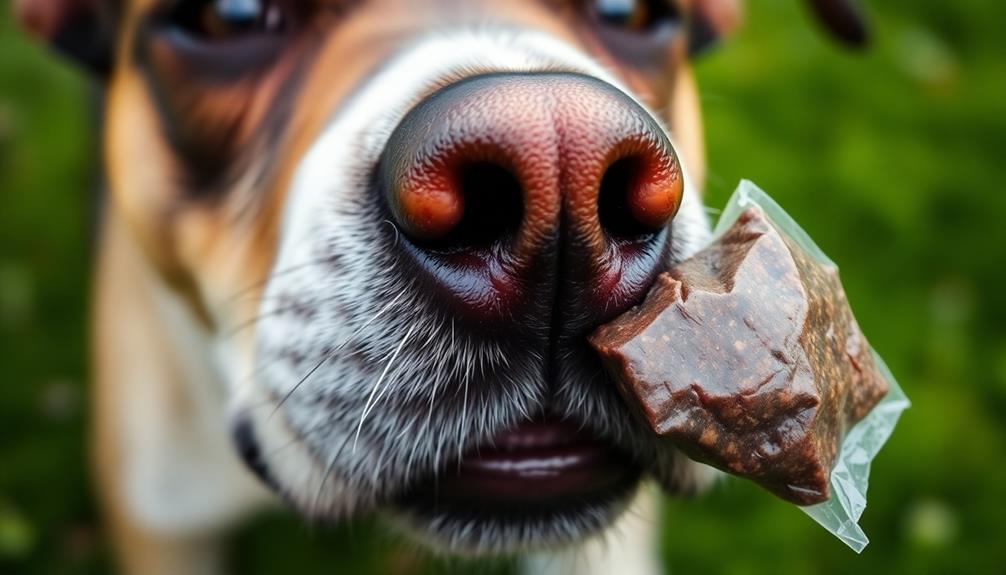
The smell of feces from a dog infected with parvovirus is unmistakable and alarming. As a pet owner, you may notice that this foul odor is different from regular dog poop. It often has a metallic and sweet scent, which can be quite shocking.
When a dog is infected with parvo, the diarrhea continues, and the smell coming from their feces can also have a strong rotting quality. This indicates that their intestines are having a tough time breaking down food.
You might see that the feces are slippery and watery, sometimes containing mucus. This unique smell acts as a warning sign for pet owners. If you detect this odor, it's important to pay attention.
The smell can help you realize that something might be wrong with your dog. While it doesn't confirm parvo on its own, it should prompt you to take action.
Increased awareness of this characteristic odor can lead to quicker veterinary visits, which is crucial for your furry friend's health. Trust your instincts, and don't hesitate to seek help if you notice this unusual smell. Your dog deserves the best care! Early detection of abnormal scents can be an important indicator of underlying health issues, allowing for timely intervention and treatment. It’s essential to understand the difference between everyday odors and those that may require medical attention, as not all smells are harmless. Just as knowing what defines a gourmand fragrance helps perfume lovers identify rich, edible-like scents, recognizing unusual odors in your pet can guide you in securing the best care possible.
Source and Composition
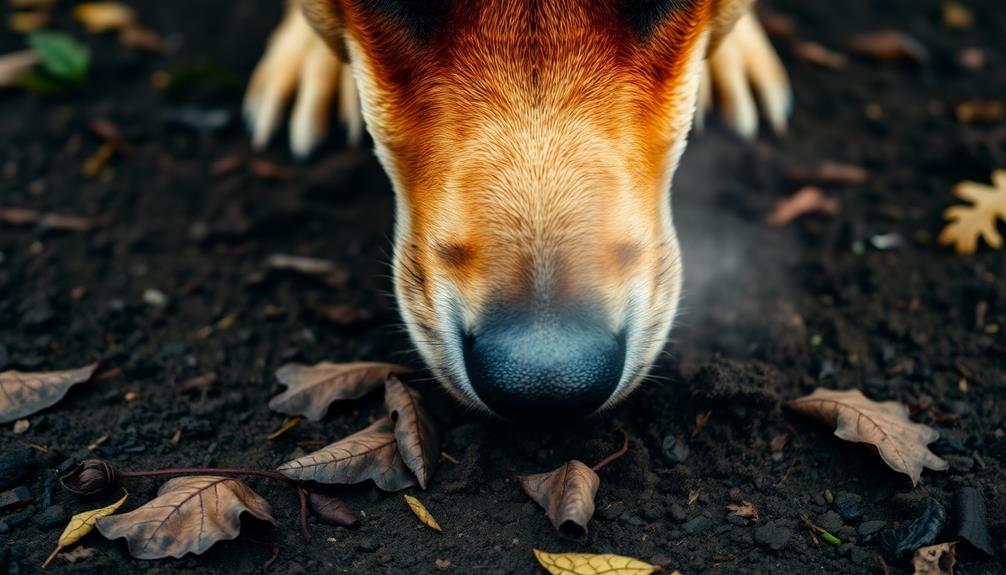
Although it may be unpleasant to consider, understanding the source and composition of the foul odor from parvovirus-infected feces is crucial for pet owners.
When your dog has parvo, the poop can have a distinct odor that many describe as metallic and sweet, mixed with a strong rotting smell. This odor comes from damage to the intestinal lining, which causes changes in fecal consistency. Instead of the usual firm stool, you might notice a watery or mushy texture.
Infected dogs shed an astonishing number of viral particles—up to 35 million per ounce of their feces! These particles play a big role in the strong smell of parvo poop.
Environmental factors like moisture and temperature can also affect how long the smell sticks around. Unfortunately, the virus can survive in contaminated areas for months, so it's essential to clean up properly.
Being aware of the source and composition of this odor can help you recognize potential parvovirus signs early. If you notice that distinct smell, it's a good idea to consult your vet right away.
Keeping your furry friend healthy is always the goal!
Typical Scenarios or Environments

Many dog owners might find themselves in high-risk environments where parvovirus can thrive. Places like dog parks and kennels are common spots for unvaccinated dogs. In these areas, the virus can spread quickly because it's highly contagious.
If you notice a distinct metallic smell or a strong rotting odor, it might be a sign of parvovirus-infected feces nearby. This odor happens when the virus breaks down food materials in a dog's intestines.
Parvovirus can survive in contaminated areas for months, so the smell might linger without proper cleaning. If you're in a park and smell something unusual, it's a good idea to keep your dog away.
Always ensure your dog is up-to-date with the parvo vaccine to help protect against this nasty virus.
If you suspect your dog has been exposed or shows any symptoms, don't hesitate to seek veterinary consultation.
Emotional or Cultural Associations
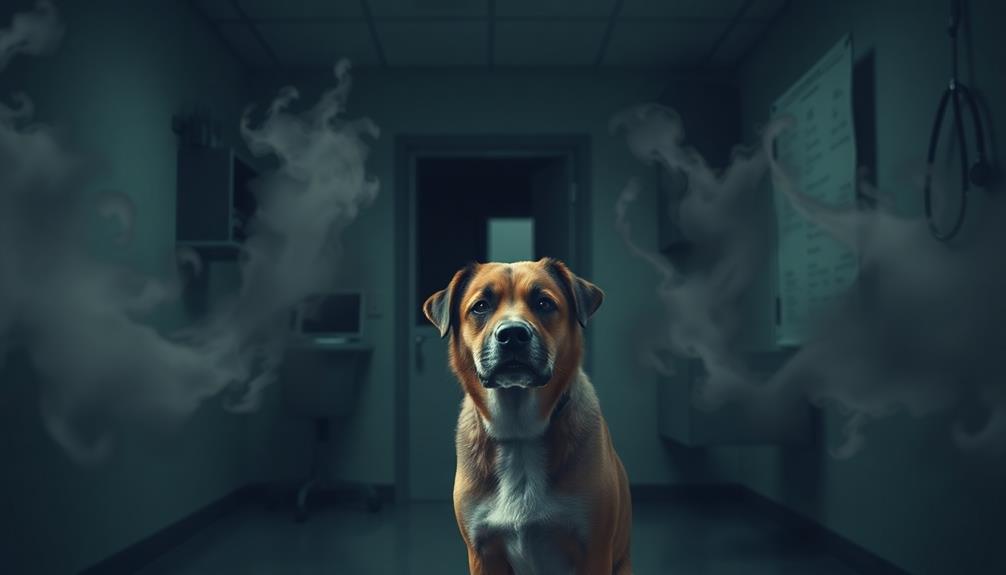
Recognizing the distinct metallic and sweet odor associated with parvovirus can trigger strong emotional responses in pet owners. When you catch a whiff of the smell of parvo, it often brings fear and anxiety. This smell signals a serious health issue for your furry friend, and it's hard not to worry. The scent becomes an overwhelming reminder of the seriousness of the situation, making it difficult to think about anything else. Unlike the fresh and calming floral notes of what verbena smells like, the odor of parvovirus evokes panic rather than peace. As pet owners, this association stays with us long after the initial encounter, creating lasting memories tied to the fear of losing a beloved companion.
Cultural perceptions play a role too. In some communities, foul odors from pets might make people think of neglect or poor pet care. These beliefs can influence how you and others around you view pet health. In certain cultures, unusual smells can lead to superstitions. People might believe that certain odors mean bad luck or illness, prompting them to seek remedies or perform rituals.
However, awareness of the smell of parvo can also be a good thing! It can help you take proactive health measures. If you notice this unusual odor, it's a signal to get your pet to the vet quickly.
Health or Safety Considerations
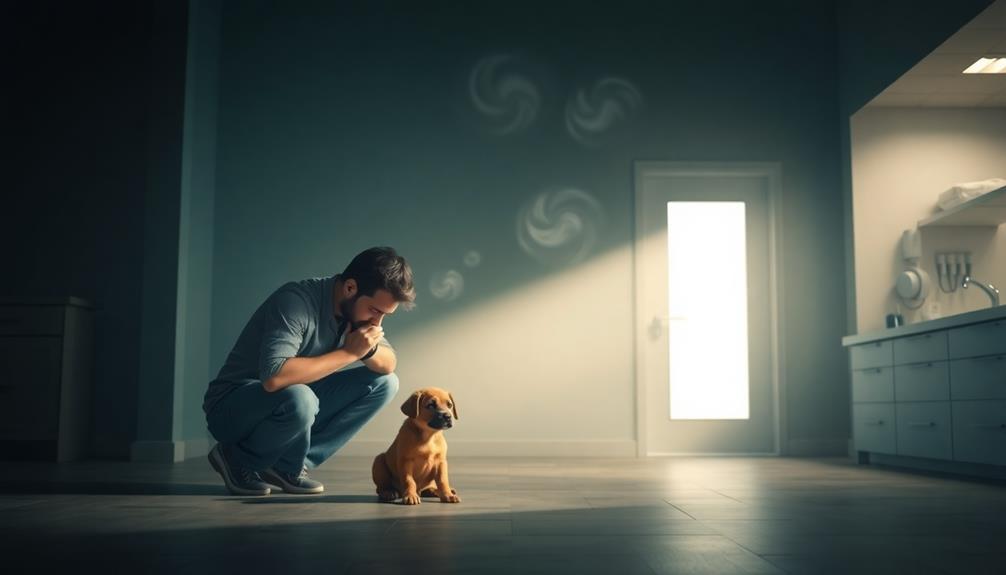
Monitoring your dog's health closely is essential, especially when you notice any unusual odors, like the metallic and sweet smell commonly associated with parvovirus. This smell often indicates something serious is happening inside your pup. Parvovirus attacks rapidly dividing cells, which can lead to severe vomiting and diarrhea. If you have a puppy, you should be especially cautious, as they're more vulnerable.
When your dog is infected, their immune system struggles to fight off the virus, and the balance of intestinal bacteria gets disturbed. You might find that the feces have a distinct, foul odor, sometimes mixed with a strong rotting smell. This can be an early warning sign that needs immediate attention.
It's crucial to act fast! The treatment for parvovirus can be expensive, and the longer it takes to get help, the worse it can get.
Always dispose of any feces properly, as the virus can survive in the environment and pose risks to other dogs.
Final Thoughts
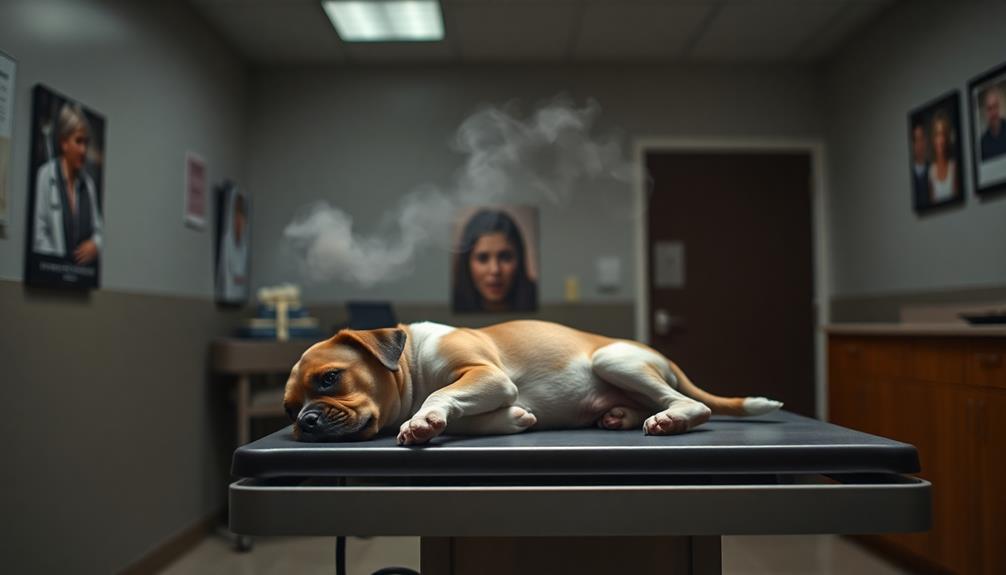
Parvovirus is a serious threat to dogs, especially young puppies, and being aware of its signs is crucial. Canine parvovirus attacks the body, specifically the GI tract, and can lead to severe health issues.
One telltale sign of infection is the distinctive smell coming from infected feces. It often has a metallic, sweet odor mixed with a strong rotting scent. This smell indicates that the dog's body is breaking down food materials in its intestines, which isn't good news!
If you notice your pup has decreased appetite, vomiting, or lethargy, it's essential to act quickly. The presence of that foul odor, along with these symptoms, means you should consult a vet immediately. Early diagnosis can make a significant difference in treatment and recovery.
Keep an eye out for these signs, and don't hesitate to reach out to your veterinarian if you suspect something's wrong. Your furry friend relies on you to keep them safe and healthy.
Frequently Asked Questions
How Can I Tell if My Dog Has Parvo?
To tell if your dog has parvo, watch for severe vomiting, diarrhea, lethargy, and lack of appetite. If you notice these symptoms, contact your veterinarian immediately for proper diagnosis and treatment.
What Can Be Mistaken for Parvo?
You might mistake several conditions for parvo, including bacterial infections, pancreatitis, or dietary indiscretions. Symptoms like vomiting and diarrhea can overlap, making it essential to consult your vet for accurate diagnosis and treatment.
What Does Parvovirus Poop Look Like?
Parvovirus poop looks very loose and watery, often containing mucus or blood. You'll notice a deep brown or black color, and the texture is slippery, making it hard to pick up. Frequent, small amounts are common.
Will a Dog With Parvo Drink Water?
Your dog with parvo might try to drink water, but often, they'll vomit it back up. It's vital to watch for dehydration and consult a vet if they refuse to hydrate properly.
